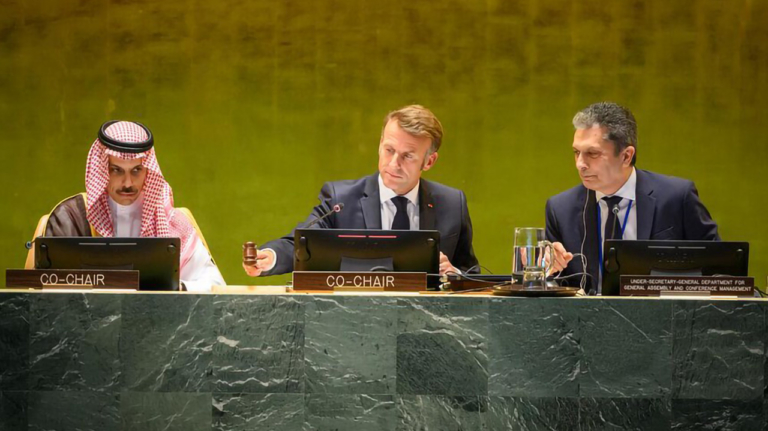
During the eightieth meeting of the United Nations General Assembly, a number of countries—Andora, Australia, Belgium, Canada, France, Luxembourg, Malta, San Marino, the United Kingdom, and Portugal—have either recognized or announced their intention to recognize a Palestinian state. They added their names to some 150 out of over 190 UN member nation-states that have already recognized the Palestinians’ right to a state of their own, although not all agree on the nature of such a state or the extent of its territorial integrity and sovereignty. However, the realization and establishment of such a state remains contingent upon approval of the UN Security Council where the United States has wielded its veto power against it because of its blind support for Israel.
Arab Center Washington DC (ACW) asked its fellows and affiliates to provide their perspectives and opinions on different aspects of this recognition and how it might impact the situation on the ground in Palestine, international law considerations, the Arab world, Israel, and the United States. Their responses are below.
Recognition of Palestine, the Legal Issues
Susan M. Akram, Clinical Professor and Director of the International Human Rights Clinic, Boston University Law School
At the General Assembly session in New York this week, 11 states declared their recognition of Palestine, bringing the total to 157, or over 80 percent of the 193 UN member states. Are there legal consequences that flow from these announcements? And is there any material significance of these legal consequences to the situation in Palestine and particularly in Gaza?
France’s President Emmanuel Macron claimed that recognizing Palestine was a necessary step, while the UN Secretary-General called Palestinian statehood ‘a right, not a reward.’ The rush to statehood recognition of Palestine can be seen either as performative or as a ‘necessary step’ if followed by a concrete series of measures. The measures that turn performance into meaningful action hinge on diplomatic relations and the full panoply of privileges that attach to statehood. Palestinian ambassadors will be installed in all countries recognizing Palestine except the United States and a handful of other countries. Palestine can now direct its demands face-to-face at the the majority of countries in the world for a sanctions regime against Israel; to investigate, prosecute, and convict Israeli war criminals; and to honor the International Criminal Court arrest warrants issued against Prime Minister Benjamin Netanyahu and former Minister of Defense Yoav Gallant, as well as other warrants that may be forthcoming.
In parallel, statehood recognition raises the stakes for the recognizing states as UN member states to fulfill their obligations toward Palestine under rulings and opinions of the International Court of Justice, and as States Parties to the Rome Statute, and the Genocide and Apartheid Conventions. States have reciprocal obligations to fellow States Parties to these treaties—meaning that the requirements of the Genocide Convention to prevent and punish genocide are no longer abstract, but flow directly to Palestine from each State Party. This is particularly so in light of the ICJ’s rulings in 2024, in which it found plausible that Israel is committing genocidal acts in Gaza. The General Assembly spelled out in its September 13, 2024, Resolution (A/ES-10/L.31) the obligations on all states from the ICJ’s Advisory Opinion of July 2024 regarding the legal consequences of Israel’s occupation. The September GA Resolution found Israel’s entire presence in the occupied Palestinian territories (OPT) an illegal occupation, required it to terminate its presence in all of the OPT by September 17, 2025, and required all states to end any aid or assistance that supports Israel’s unlawful occupation. As the GA Resolution noted, aid and assistance includes economic, trade, weapons, cultural and all other dealings with Israel—these are now incumbent upon all recognizing states as bilateral obligations toward Palestine directly.
Of course, the date the ICJ and the General Assembly set for Israel to terminate its presence in the OPT has passed without compliance. The orders from the ICJ to Israel to cease its genocidal acts and lift the siege on Gaza have been ignored, as have UN demands and GA votes for a ceasefire. The first item in the New York Declaration that the EU, the League of Arab States and 16 other countries signed in July 2025, is to ‘end the war in Gaza.’ The Declaration is on the table at the UN80 session, and the commitments in it include the legal obligations above as part of a series of concrete steps the signatories have agreed to take. The flurry of states recognizing Palestinian statehood may well move the needle forward, but only if they implement the critical measures they are legally required to take, including most urgently implementing a sanctions regime against Israel and bringing an end to the genocide.
The Arab World and the Palestinian State
Imad K. Harb, Director of Research and Analysis
Establishing an independent and sovereign Palestinian state is first and foremost the right and responsibility of the Palestinian people. The Arab world—states, governments, and people—have the attendant responsibility of helping to shepherd that potential into reality and of strengthening it and its institutions once it is established. While their relationship with independent Palestinian political action since the 1960s has waxed and waned in accordance with their own interests, Arab states have generally held the line on advocating and demanding sovereignty and independence for Palestine.
In 2002, and during an Arab summit meeting in Beirut, the Arab countries coalesced on a plan, the Arab Peace Initiative (API), that would resolve the Arab-Israeli and Palestinian-Israeli conflict. Among other things, the API called for Israel’s withdrawal from the occupied West Bank and Gaza Strip and Syria’s Golan Heights, and the establishment of an independent Palestinian state within the June 4, 1967, borders, with East Jerusalem as its capital. In exchange, the Arab states would normalize relations with Israel. The API continues to be the Arab world’s plan for ending the conflict and has been reaffirmed in almost every Arab summit meeting since 2002.
The current drive at the United Nations to recognize a Palestinian state relies on a widespread acceptance of a two-state solution for which Arab countries and the international community, including the United States, have striven, until the concept has practically disappeared from American foreign policy under the Trump administration. Israel has never fully and unequivocally accepted the API or the two-state formulation, because doing so would require unacceptable concessions, specifically withdrawing from the West Bank and Gaza. What the Arab world is called upon to do today is to help further widen the circle of countries recognizing a Palestinian state and to work toward achieving that goal as soon as possible. Ignoring the Palestinians’ inalienable right to independent statehood is a violation of international law that guarantees self-determination for all peoples under occupation.
Israel Outraged at Global Recognition of Palestinian State
Khalil E. Jahshan, Executive Director
Since the beginning of diplomatic activity led by France and Saudi Arabia to promote recognition of the State of Palestine in December 2024, Israel has tried to maintain its composure and display a brave face but failed to mask its furious indignation at the expanding campaign at the United Nations. Israeli political leaders, legislators, and political analysts have been for many months expressing their concern and opposition to the specter of new members among the 193 UN member states adding their names to those recognizing Palestine as a sovereign state.
The initial counter-campaign by Prime Minister Benjamin Netanyahu’s government to downplay and ridicule the idea as futile, inconsequential, and void of legal or practical significance quickly shifted to denial and intimidation to prevent as many potential signatories as possible from joining the unstoppable effort at the UN. Led by Netanyahu, Israelis argued that that recognition at this specific time rewards Hamas by empowering it to reject Israeli and US attempts to dictate their own political and military victory in Gaza. They went as far as accusing those spearheading the pro-recognition campaign of outright antisemitism, support for terrorism, and undermining the fragile regional stability and the “ongoing search for peace.”
Netanyahu and his supporters in Washington continue to articulate a two-pronged argument. First, a sovereign Palestinian state constitutes a direct and existential threat to the State of Israel, thus, it should be prevented at any price. Second, the emergence of an independent state of Palestine in the West Bank and Gaza, with East Jerusalem as its capital, will essentially be a manifestation of the Gaza war brought closer to the heart of Israel, a potential that could not be accepted under any circumstances. Netanyahu has been time and again repeating the words, “it will not happen.”
What are Israel’s options in light of its failure to blunt this diplomatic campaign?
The Netanyahu government has cornered itself diplomatically, leaving few reasonable options for it to pursue. Most likely, it will pursue of military victory in Gaza to eliminate Hamas militarily and politically and render the Gaza Strip uninhabitable for the distant future. Other options proposed in the Israeli media include the annexation of the West Bank, in toto or in part, under the pretext of securing Israeli borders from the threat of an emerging belligerent Palestinian state. Others have suggested de facto annexation of the Jordan Valley or the western parts of the occupied West Bank adjacent to the “Green Line.”
The American Response to a Global Reaction to Genocide
Laurie King, Member of the Academic Advisory Board
In the wake of a cascade of recognitions of a Palestinian state by numerous American allies in Europe and others in the global south, the United States’ response to an overdue international reaction to Israel’s genocidal assault on the people of Gaza is already evident and unsurprising.
Secretary of State Marco Rubio’s recent visits to Israel and Qatar sent a clear message that Israel enjoys the unconditional backing of the United States, even after its unprecedented attack on Doha. The US representative to the United Nations last week voted against the growing international demand to rein in the Netanyahu government’s ongoing merciless attacks on Gaza, which have led to the deaths of over 65,000 people, one third of whom were women and children.
In just eight months, US support for the United Nations and the post-WWII international human rights legal regime has all but disappeared under President Trump’s isolationist and imperious administration. Whereas the previous Biden administration also supported Israel without reservations, it nonetheless showed an outward display of backing for a diplomatic solution, even if that turned out to be tepid window dressing. The death toll in Gaza continues to rise precipitously and is exacerbated by famine and the killing of food seekers at US administered aid sites. Israel is clearly intent on killing or exiling Gazans, signaled by the unrelenting destruction of Gaza City and the mass flight of people south to other, no less dangerous, places. A multi-polar response is ramping up.
Speeches at the UNGA—from Trump’s rambling and embarrassing display of arrogance and hubris to Columbia’s, Turkey’s, Indonesia’s, Spain’s, and Brazil’s passionate calls for action on Gaza—show that the United States is not only isolationist but is increasingly isolated. The international community is rising up to deploy the UN’s institutions and mission to halt a genocide—the very crime that led to the establishment of the world organization itself eight decades ago.
US veto power in the UNSC, however, as well as the strange, cult-like obeisance to President Trump on the part of Congress, the Supreme Court, universities, law firms, and the mainstream media, augur for continued deadlock at the United Nations. Although the governments now recognizing a Palestinian state enjoy growing support at home for trying to halt Israel’s war crimes, the carnage in Gaza is likely to continue without wider, deeper, and louder opposition to Trump’s Middle East policies and the United States’ iron-clad protection of Israel. This is no small feat considering the growing repression of free speech and a brutal clampdown on Americans calling for an end to the genocide.
Performance over Progress
Yousef Munayyer, Head of the Palestine/Israel Program and Senior Fellow
As more western nations recognize the state of Palestine this week, joining the vast majority of the world that largely did the same back in the late 1980s, it is fair to ask what if anything this recognition will do. While these proclamations are historic, they leave many Palestinians bewildered and bitter. Not only did these western nations wait years to catch up with much of the rest of the world, they recognized a Palestinian state at a time when many of them are actively enabling the continued genocide of the Palestinian people by the State of Israel. Publics in these nations are outraged over the policies of their governments which have either directly contributed to the genocide or failed to challenge it.
Instead of addressing the ongoing genocide and the continued daily killing of scores of Palestinians, these governments have instead chosen a more performative route, likely hoping to mollify domestic dissent. The right decision would be to immediately follow this recognition with an end to all support for Israel’s military until such time when it ends all violations of international law. Until then, these proclamations remain merely performative exercises rather than being paths toward progress.
At the same time, it is important to recognize that in taking these steps, western nations are breaking with the wishes of both Washington and Tel Aviv. This is not an insignificant thing, especially at a time when the extremist Israeli regime is speaking openly about perpetual occupation and ethnic cleansing of the West Bank and Gaza. Recognition, at the minimum, sends the message that the international community will not accept Israel’s plan to do away with the right of Palestinians to self-determination. Still, an important priority today is to do something to prevent Israel from ethnically cleansing the Palestinians.
France’s Recognition of Palestine: Principle or Political Ploy?
Isabel Ruck, Head of Research and Scientific Coordination, CAREP Paris
France has just recognized a Palestinian state—after two years of near-unconditional support for Israel. Some hail it as a historic step toward justice. But the timing raises eyebrows: President Emmanuel Macron is grappling with nationwide protests over pension reforms, plunging approval ratings, and unrest across the political spectrum. Is this a principled stance—or a carefully calculated political move?
On the international stage, the recognition aligns France with a growing chorus of European voices advocating for Palestinian self-determination. It nudges the European Union out of its habitual caution, signals to Israel that European patience is fraying, and could inject momentum into long-stalled negotiations. Yet in practical terms, without backing from the EU or the United States, the move risks being largely symbolic—a diplomatic flourish rather than a game-changer.
Domestically, the stakes are equally clear. Macron has long struggled to win support among France’s Muslim and Arab communities—a vulnerability his opponents know well. His 2021 “anti-separatism” law, aimed at curbing Islamist extremism, drew sharp criticism for restricting religious freedoms and disproportionately targeting Muslim institutions. Political rhetoric linking Islam to extremism, combined with crackdowns on pro-Palestinian protests after October 7, 2023, has only deepened feelings of marginalization.
Viewed this way, Macron’s recognition of Palestine reads as much like domestic signaling as foreign policy. It is a visible gesture of solidarity toward communities that have felt sidelined—an effort to project moral authority abroad while shoring up support at home. And amid social unrest over pension reforms, the timing is impeccable: a high-profile statement abroad doubling as subtle electoral calculus.
Ultimately, France’s recognition of a Palestinian state is both substantive and performative. It sends a clear diplomatic signal but is unlikely to alter realities on the ground in Israel and Palestine. It revives the European myth of a two-state solution—a vision on which most Palestinians have long given up. It also is an attempt to reinforce the position of the Palestinian Authority, though many Palestinians view it as increasingly illegitimate. In short, the move seems less driven by true concerns for Palestinian needs than by France’s own quest for moral coherence.
European partners will watch closely, parsing ethical intent from political maneuvering. At home, the French public may ask the same question: is this a genuine push for justice—or a cleverly timed distraction?
The views expressed in this publication are the authors’ own and do not necessarily reflect the position of Arab Center Washington DC, its staff, or its Board of Directors.
Featured image credit: Flickr/UN Photo/Loey Felipe






